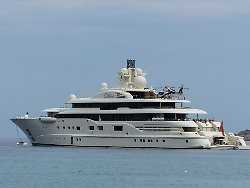More than a thousand people are on the EU sanctions list because of the Russian attack on Ukraine. So far, Germany has only frozen manageable amounts from those affected. Two packages of laws are intended to make it easier to crack down on oligarchs and politicians.
If you look at the opposite dock of the Blohm+Voss shipyard from the Hamburg Landungsbrücken, you are currently enjoying more than the imposing sight of the Port of Hamburg. You can also see a small part of the economic war that the European Union and its allies are waging against the Russian state and its elites. Hidden under white tarps stretching over scaffolding, the mega yacht “Dilbar” owned by the Russian oligarch Alisher Usmanov is on the dock. Because the commodity and media tycoon who is close to Putin – along with 1090 other Russian and Belarusian entrepreneurs and politicians – on the EU sanctions list stands, the German authorities have frozen the ship. It may not be moved, nor may work on it be continued.
The “Dilbar” is part of the assets worth 29.5 billion euros that the EU states say they froze until mid-April, including boats, helicopters, real estate and works of art worth almost 6.7 billion euros. In addition, were according to a task force of the EU Commission Money movements worth around 196 billion euros blocked. However, Germany’s share of frozen goods is comparatively small. The “Dilbar” stands out with its estimated value of 600 million euros. By the end of March, only 95.5 million euros from account balances could be attributed to sanctioned individuals and companies and frozen.
Germany badly prepared
According to experts, Germany is weak in the fight against the oligarchs, who often work with company structures that conceal their origin, as in the fight against money laundering and organized crime. In comparison with Italy and its anti-mafia legislation, the enforcement of sanctions often fails due to unclear responsibilities, limited powers and insufficiently strict criminal legislation. The traffic light government, led by the finance and economics ministries, wants to change that as quickly as possible. According to government sources, two sanctions enforcement laws are to be passed by the end of the year, the first before the summer break and the second by the end of the year. The drafts for the first legislative package are to go to the final vote between the ministries on Monday so that they can then be passed by the cabinet and submitted to the Bundestag.
One of the key changes in the first legislative package is that sanctioned persons will in future have to disclose accounts and assets to the German authorities of their own accord. If they do not comply and large sums of money or other goods are nevertheless clearly assigned to these people, it should be a criminal offense in the future. Then these assets may not only be frozen – this means above all a ban on export and sale – but can be confiscated by the state. They would also be gone if the sanctions were lifted one day.
A question of jurisdiction
While the “Dilbar” was reportedly unable to leave anyway due to work on the yacht, other movable property quickly disappeared. After all, the oligarchs know their assets are under pressure in the EU. When a jet that apparently also belonged to Usmanov – an Airbus A340-300 the size of a passenger plane – stood at Munich Airport at the end of February, he was able to take off unmolested. The background was ambiguity as to who was actually responsible for enforcing the sanctions in this case and ad hoc lack of evidence that the machine, named “Bourkhan” after Usmanov’s father, actually belonged to the oligarch.
The law corrects these shortcomings. It regulates the responsibilities, which lie primarily with the federal states, and allows the temporary freezing of goods in order to clarify ownership at all. In the future, criminal prosecution authorities, bank supervisory authorities and other institutions with relevant information should be allowed to exchange their knowledge for such research. The Financial Intelligence Unit (FIU), which is subordinate to the Federal Ministry of Finance and is primarily responsible for preventing and investigating money laundering, plays an important role. The FIU should act on its own initiative and be able to analyze data if there are sanctions. The financial market supervisory authority BaFin is also to be strengthened in enforcing trading bans.
National Coordination Point and Register
The implementation of the sanctions is currently being coordinated by a clearing office based at the Federal Ministry of Finance. According to government circles, “deficits in the enforcement of sanctions have become apparent” in the agreements between the federal states and federal authorities in the past few weeks. As part of the second legislative package, which is still being drawn up, a “central coordination office” is to be named by the end of the year, which will then also have permanent coordination responsibility, as it is also said.
In this second step, overall responsibility for enforcing sanctions is to be streamlined and centralized. In addition, the “establishment of a national register for assets of unclear origin” is planned. This will then not only be relevant when investigating oligarch fortunes, but could also permanently strengthen Germany’s defenses against money laundering and organized crime.
